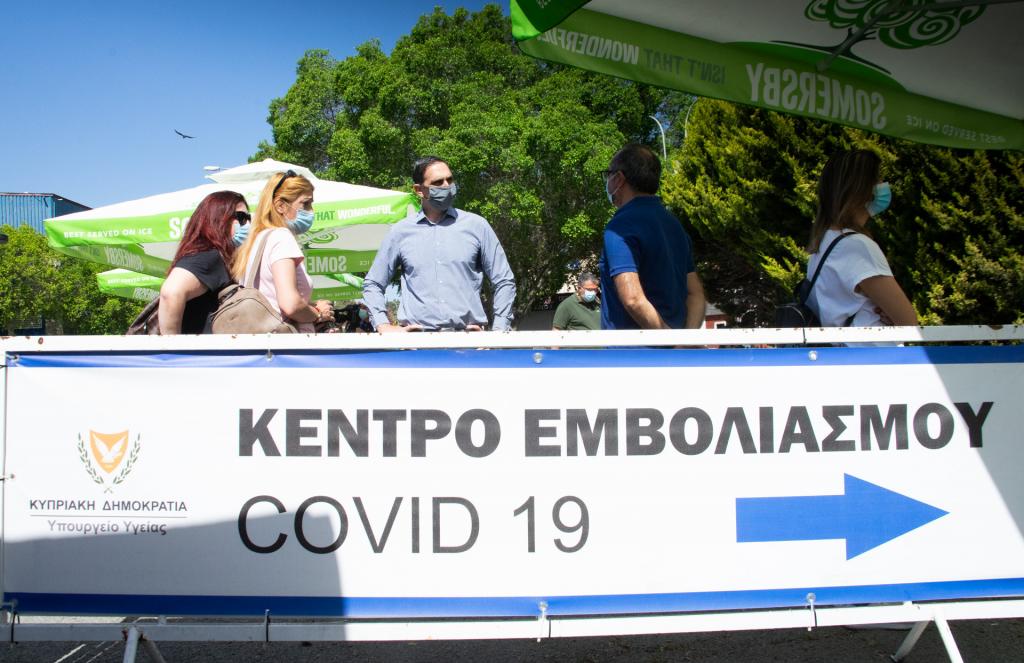Thessaloniki gets ready for its metro launch in November
The underground rapid transit lines have been under construction for almost two decades due to various project delays
 TheMayor.EU logo
TheMayor.EU logo 
Minister of Health Constantinos Ioannou (C) visiting a vaccination centre, Source: Constantinos Ioannou on Facebook
The island will be gradually exiting the snap lockdown from 10 May
The Cypriot government agreed late on Wednesday on a series of measures for a gradual reopening of the economy and society after the 14-day snap lockdown. The decision was made after evaluating the country’s epidemiological situation which had been stabilizing in the last few days, with hospital admissions gradually coming down, according to the government press and information office (PIO).
The new measures will be in effect from 10 May until 31 May. The most essential changes are that the requirement to send a text message for going outside of home will be repealed, but a so-called Coronapass for visiting crowded places will be introduced.
From 10 May, the curfew will start at 11 at night and last until 5 in the morning with exceptions for workers holding “Confirmation for Employee’s Movement” Form and medical emergencies. Sending an SMS will no longer be needed. In-school learning will resume, but students must present a weekly rapid antigen test.
Coronapass will be required for all visitors of outdoor catering areas, shopping malls, gyms, theatres and places of worship. Such a pass entails either submitting a negative PCR or rapid test not older than 72 hours, having been vaccinated with at least one dose 3 weeks prior or having contracted the virus in the past 6 months. Initially, the document should be a physical copy of those certifications, before an application is created.
The government described the coronapass as a temporary measure that will be applied for a transitional period in order to ensure that movement and social contacts will be as safe as possible before the desired immunity is reached through vaccinations. Compliance control will be exerted by the Police or the Ministries and Departments depending on the companies in their areas of responsibility.
The changes were clarified by the Minister of Health Constantinos Ioannou at a press conference on Thursday. He explained that the relaxation of restrictions should be done gradually in three phases, in order to give more time for the epidemiological indicators to stabilize, while speeding up the vaccination process in order to achieve the goal of giving at least the first vaccine dose to more than 60 percent of the population by the end of June.
In the first phase, from 10 May until 16 May, the measures that were valid until 25 April (the start of the “short, sharp” lockdown) will be restored with the same restrictions and health protocols in place. The goal is to ensure a smooth transition to the next phase, when more businesses will reopen and further relaxation in social activities will be allowed.
From 17 May, the number of people permitted to visit places of culture and of religious worship will increase. Organization of social events, such as weddings and baptisms, will be allowed. Businesses that have remained closed for months, such as playgrounds, amusement parks, casinos, zoos, picnic areas, will be reopening.
From 1 June, depending on expected improvement in the epidemiological situation through scaled up vaccine rollout, more restrictions will be lifted. For example, indoor spaces of bars and restaurants will reopen.
The introduction of the coronapass has provoked a mixed reaction among the public, lawyers and the hospitality sector, reports Cyprus Mail. While some see the measure as a nagging, but necessary step to unlock the economy, others say that it violates human rights and personal freedoms.

The underground rapid transit lines have been under construction for almost two decades due to various project delays

Now you can get your wine in Talence by paying directly in Bitcoin

That’s because the state has to spend money on updating the railway infrastructure rather than subsidizing the cost of the popular pass

Rethinking renewable energy sources for the urban landscape

The examples, compiled by Beyond Fossil Fuels, can inform and inspire communities and entrepreneurs that still feel trepidation at the prospect of energy transition

Now you can get your wine in Talence by paying directly in Bitcoin

The 10th European Conference on Sustainable Cities and Towns (ESCT) sets the stage for stronger cooperation between the EU, national and local level to fast track Europe's transition to climate neutrality.

At least, that’s the promise made by the mayor of Paris, Anne Hidalgo

The underground rapid transit lines have been under construction for almost two decades due to various project delays

At least, that’s the promise made by the mayor of Paris, Anne Hidalgo

Hostal de Pinós is located in the geographical centre of the autonomous region

Despite its church-y name, the district has long been known as the hangout spot for the artsy crowds

Urban dwellers across the EU are having a say in making their surroundings friendlier to people and the environment.

Forests in the EU can help green the European construction industry and bolster a continent-wide push for architectural improvements.

Apply by 10 November and do your part for the transformation of European public spaces

An interview with the Mayor of a Polish city that seeks to reinvent itself

An interview with the newly elected ICLEI President and Mayor of Malmö

A conversation with the Mayor of Lisbon about the spirit and dimensions of innovation present in the Portuguese capital














